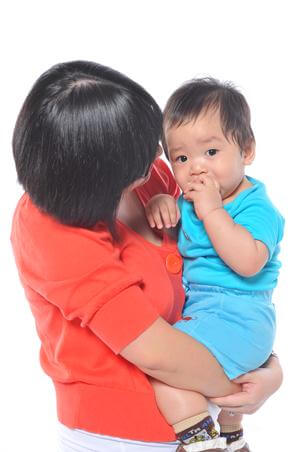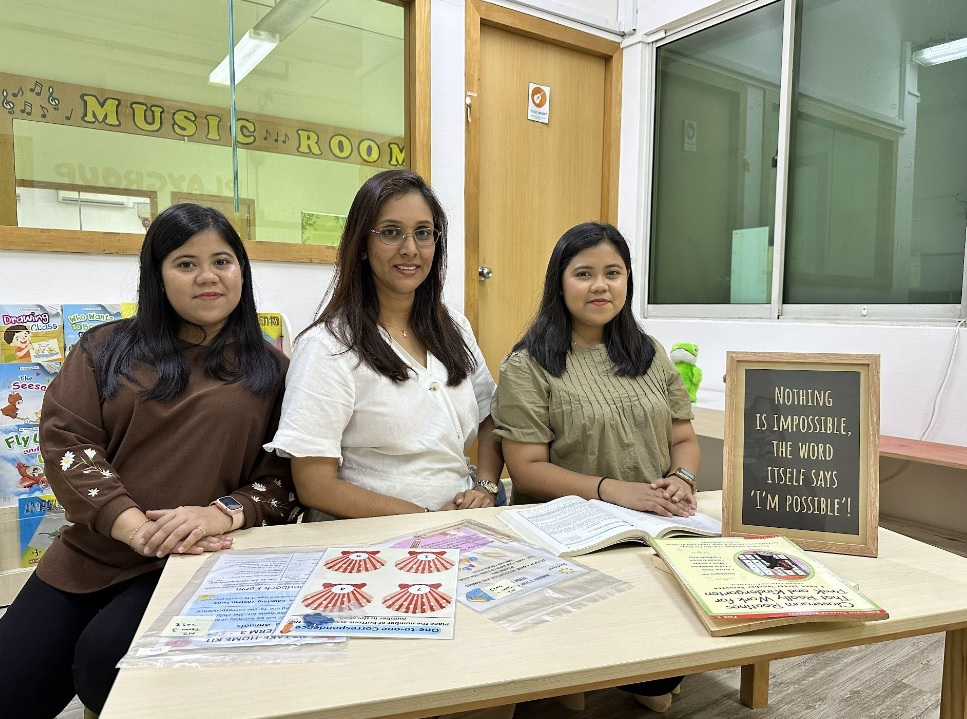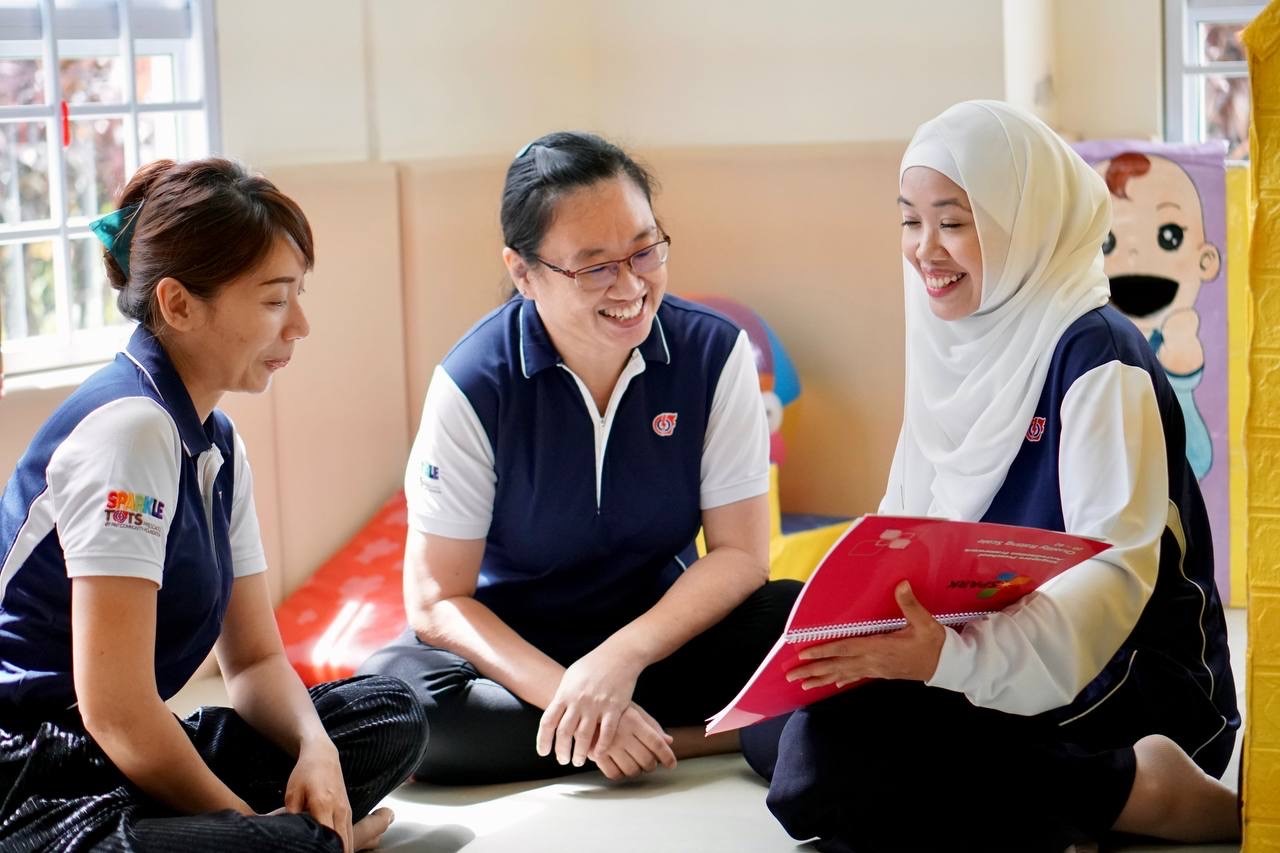WHAT YOU CAN DO |
|---|
| Regulate behaviours by offering choices!
Offering choices can help your toddler to regulate his behaviours and emotions, especially when you are caught in a power struggle. Offer two choices for things that
will involve them directly. For example, "Would you like to wear the blue shorts or the red shorts?" or "Would you like to eat the apple or pear?" |
| | |
 | Create opportunities to express feelings through imaginative play.
For your older child, let her express her feelings and emotions through play. Provide dolls, figurines, clothes for dress-up and other materials
(e.g. hats, toy telephones, etc). |
| | |
Be a playful parent!
Engage your child in activities that involve eye contact and turn-taking to show your child that you are responsive to her actions. Use a sing-song voice and positive facial expressions
to encourage your child to participate. Your baby's coos, gurgles or even a smile show that he is participating! |  |
| | |
Know your child's temperament and take baby steps!
Every child has different temperaments and behaves differently in social settings. If your child is wary of strange environments, do not rush her into meeting
new people. Introduce new friends gently and if your child appears stressed, move away for a while to help her calm down before rejoining the group. |  |
| | |
Babies love watching themselves in the mirror!
Provide your baby with a mirror and watch while she discovers her hands and feet and learn to recognise herself in the mirror! You can engage with baby by talking
to her about what she can see in the mirror. Make funny faces and have fun together! |  |
| | |
 | Say hello to neighbours!
Bring your child through the neighbourhood and let her meet and greet the neighbours. Organise play dates with other children. This creates opportunities to interact and socialise
with peers.
~ Ms N. Pushpavalli, Principal of Ramakrishna Mission Sarada Kindergarten |
| | |
 | Stay calm!
Avoid being overly anxious if your child becomes upset about being apart from you. Before leaving her, provide her with the reassurance that you will eventually be back for her.
~ Ms Sai Jun
Lin, Psychologist, Department of Child Development, KK Women's and Children's Hospital |
| | |
 | Spend time playing with your child!
Be attentive and responsive to her needs to establish a close bond and a trusting relationship. Provide a safe and secure home environment by establishing regular daily
routines, e.g. for baths, meals, naps and bedtime.
~ Ms Sai Jun Lin, Psychologist, Department of Child Development, KK Women's and Children's Hospital |
| | |
Show positive responses!
Respond positively to your child's initiation of social interactions, which can range from cooing, smiling, "peekaboo" or mimicking adults' simple actions for younger babies, to invitations
for play for children between one to two years old.
~ Ms Sai Jun Lin, Psychologist, Department of Child Development, KK Women's and Children's Hospital
|  |
| | |
 | Provide opportunities for safe exploration!
Provide opportunities for your child to explore her environment in a safe way! For example, by supporting her physical activity rather than overprotecting them
by "scaring" them into a fear of falling.
~ Dr Jane Ching-Kwan, Chief Executive Officer/ Principal, KLC International Institute |
| | |
 | Take your time.
Provide sufficient time for your child to move from one activity to another. Create an environment that is relaxed and stress free, and more importantly, refrain from rushing. Children experience
not only a great deal of enjoyment, but they learn to expand their focus and being on task . |
| | |
 | Predictability matters.
Foster a sense of stability by having a predictable daily routine and environment for your little one. This will help your child to lay a good foundation to develop confidence and a
set of skills to engage in reciprocal exchanges. |
| | |

| Respect is the essence.
Understand and accept that your child is different, that she has her own needs, interests, likes and preferences. Offer your child choices. For instance, would she like to wear a printed
or plain tee-shirt? |
| | |
Acknowledge and affirm.
Comment and show delight when your baby shows new skills like reaching for an object or dumping a toy into a container. Your child will respond favourably to your positive reaction
which will help lay strong foundations for strong social-emotional development. |  |
| | |
Be sensitive.
Be sensitive to your child's needs, responses and cues. Respond warmly and in a consistent manner. Sometimes it only takes a nod or a smile to assure the child that you are there for him. |  |
| | |
Give her choices.
Build your child's confidence and autonomy by giving her opportunities to make choices. You could ask her, "Would you like this or that?" Affirm her choices and you can help her boost her self-esteem.
|  |
| | |
Observe and encourage.
Pay attention when your child explores her toys or objects. Express your interest in what she is doing and show enthusiasm verbally and non-verbally, for example, nodding your head and
smiling. Your child looks forward to receiving your assurance and approval. This enhances her confidence and motivates her to try out new things. |  |
| | |
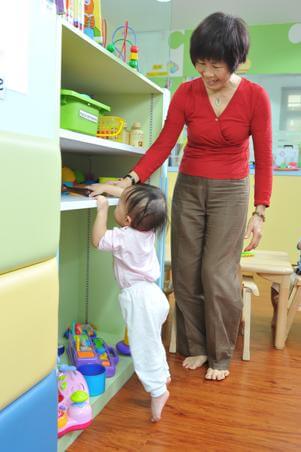 | Be there for her.
Provide your child with opportunities to explore new things, people and places. Be sure to let her know that she is safe and that you are right there to support her to explore and figure
out new situations. This allows her to learn about the world, figure out how things work and builds her confidence. |
| | |
 | Build resilience.
Motivate and encourage your child to try again when faced with challenges. Don’t accommodate every need or provide all the answers. Allow your child to make mistakes and problem-solve. You can help her manage her emotions when she is in a challenging situation and don’t forget to model resiliency. Helping your child deal with difficulties not only builds character but also (and) strengthens her confidence and problem solving skills. |
| | |
 | Be patient.
Your child may be shy about meeting new people and anxious in new situations. Give her time. If possible, prepare her in advance before introducing new friends or visiting a new place. Respect
her need for more time to warm up to the new faces, names and situations. Don’t rush her. She will come to open up before you know it! |
| | |
Applaud efforts and struggles.
Focus your praises on the child’s effort, her behaviour and output, not her attributes. When you applaud your child’s efforts, you are helping her to develop a positive mindset
which will help her work on her weaknesses and accept challenges. She may not have met your expectations or she could have left a task half-completed. Nevertheless, she has tried, so acknowledge her efforts. |  |
| | |
Pre-empt actions, visits or events.
Inform your child beforehand if you are visiting friends or relatives, to let her know where you are taking her and who you will be meeting. Respect the person in your child.
This increases her awareness about the different kinds of social activities she engages in. By respecting your child, your child learns how to respect others through your positive role modelling! |  |
| | |
 | Encourage self-help.
When you provide opportunities for your child to do simple tasks, you are helping to develop his sense of competence and confidence. He can help to put the toys away, put on his footwear,
brush his teeth and feed himself. Ignore the mess. Things will improve as your child masters his skills |
| | |
I love you.
Your child needs to know and hear that you love her. Even when she is having tantrums or when she does something wrong, assure her that you love her even if you do not give in to her demands. You
could say: “I love you and I know you are upset and I don’t like the way you threw those toys about. ." Try to handle the situation in a calm and reassuring manner for your child to model the behaviour in future. | |
| | |
| Praise and affirm.
When your child helps to put away the toys, praise and affirm her actions. You could say “I like the way you helped mummy to tidy up. What a great helper you are!” or even “Good
job!”. Your child gets pleasure in receiving praises for her accomplishments. |
| | |
| Bond and nurture.
Spend time with your baby at every opportunity. Knowing that you are there for her will help her feel safe and secure. |
| | |
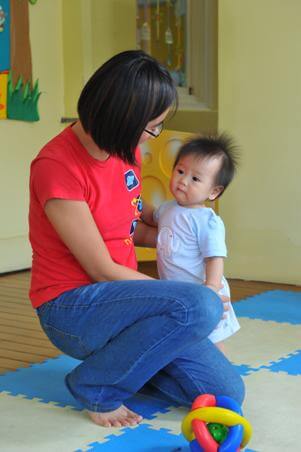 | Respect, respond and reciprocate appropriately.
Respond to your infant’s cries, whether in distress or simply because she needs a cuddle. When you respond in a calm and soothing voice, and with a pleasant
facial expression, you are signalling to your child how important she is to you. |
| | |
Have dialogue.
Talk to your infant and pause to give her time to respond. Your infant may do these using gestures, body movements, facial expression or even a smile. Sustain the 'conversation' by reading your
child’s cues and taking turns to 'speak'. |  |
| | |
Have face-to-face moments.
Create opportunities for intimate and one-to-one interaction daily. Look into your infant’s eyes when you talk or sing to her. In doing this you acknowledge her as a
person in her own right. | 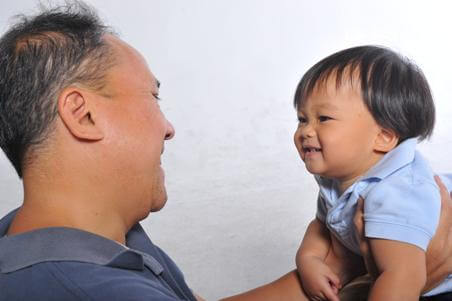 |
| | |
Acknowledge feelings.
Your infant/baby will communicate her feelings through a range of sounds, facial expressions and even actions. Acknowledge her expressions in words. For instance, you might say: “I
know you are feeling upset now and you really want that toy. Let’s put it away and we will play with it later.” |  |

























